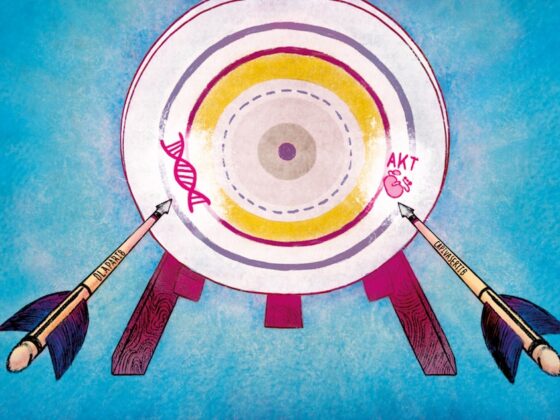In addition to previously reported survival benefits, the taxane cabazitaxel improved quality of life in patients with advanced metastatic prostate cancer compared to the androgen signalling targeted inhibitors abiraterone and enzalutamide, reports the latest analysis of the CARD trial (Fizazi K et al. Lancet Oncol 2020).
“This analysis can provide reassurance to physicians and patients that receiving cabazitaxel chemotherapy will not negatively affect HRQOL (health related quality of life) or induce additional toxicity when compared with oral androgen signalling-targeted inhibitors,” write the authors of the European study.
For the open-label phase IV CARD study, between November 2017 and November 2018, 255 patients with confirmed metastatic castration-resistant prostate cancer who had previously received docetaxel plus an androgen-signalling-targeted inhibitor (abiraterone or enzalutamide) were randomly assigned 1:1 to receive cabazitaxel (n=129) or to the alternative androgen-signalling-targeted inhibitor, i.e. from abiraterone to enzalutamide or vice versa (n= 126). CARD involved 62 clinical sites across 13 European countries.
Outcomes regarding disease progression and survival were reported at the end of 2019 in the New England Journal of Medicine. After a median follow-up of 9.2 months, 73.6% of patients in the cabazitaxel group had experienced disease progression (evaluated by imaging) or death compared to 80.2% in the group receiving abiraterone or enzalutamide (HR=0.54; 95%CI 0.40‒0.73; P<0.001).
Many patients with advanced metastatic castration-resistant prostate cancer have bone metastases, which cause pain and deterioration of quality of life. As prognosis for metastatic prostate cancer has improved, quality of life is increasingly important, yet it continues to be underevaluated. The current analysis by Karim Fizazi, the corresponding author from Institut Gustave Roussy, France, and colleagues, set out to explore the effects on quality of life.
The results showed:
- Pain response (defined as at least a 30% decrease from baseline in average BPI-SF pain intensity scores) was observed in 46% of patients with cabazitaxel versus 19% with abiraterone or enzalutamide (P<0.0001).
- Median time to pain progression was not estimable with cabazitaxel and was 8.5 months with abiraterone or enzalutamide (HR=0.55, 95%CI 0.32-0.97; log-rank P=0.035).
- Median time to symptomatic skeletal events (defined as either the use of external beam radiotherapy to relieve bone pain, occurrence of new symptomatic pathological fractures, occurrence of spinal compression, or tumour-related orthopaedic surgical intervention) was not estimable with cabazitaxel, and was 16.7 months with abiraterone or enzalutamide (HR=0.59, 95%CI 0.35–1.01; log-rank P=0.050).
- Median time to Functional Assessment of Cancer Therapy-Prostate (FACT-P) score deterioration was 14.8 months with cabazitaxel versus 8.9 months with abiraterone or enzalutamide (HR=0.72, 95%CI 0.44‒1.20; log-rank P=0.21).
- There was a significant treatment effect seen in changes from baseline in the EuroQoL-5 dimensions, with the 5-level scale (EQ-5D-5L) utility index score favouring cabazitaxel over abiraterone or enzalutamide (P=0.030), but no difference was found for the EQ-5D-5L visual analogue scale (P=0.060).
“Here we show that cabazitaxel significantly improves pain response and time to pain progression and reduces the risk of developing symptomatic skeletal events compared with abiraterone or enzalutamide, and is not associated with a detrimental effect on HRQOL in patients with metastatic castration-resistant prostate cancer who have received previous docetaxel and progressed on the alternative androgen signalling inhibitor within the previous year,” write the authors.
Commenting on the study Simon Grieveson, Head of Research Funding at Prostate Cancer UK, said, “Cabazitaxel is already being offered to this group of men in the UK, but these findings reinforce the importance of ensuring the best treatments are made available to these men that will give them valuable extra time with their loved ones whilst giving them the best quality of life possible.”
Illustration by Maddalena Carrai












